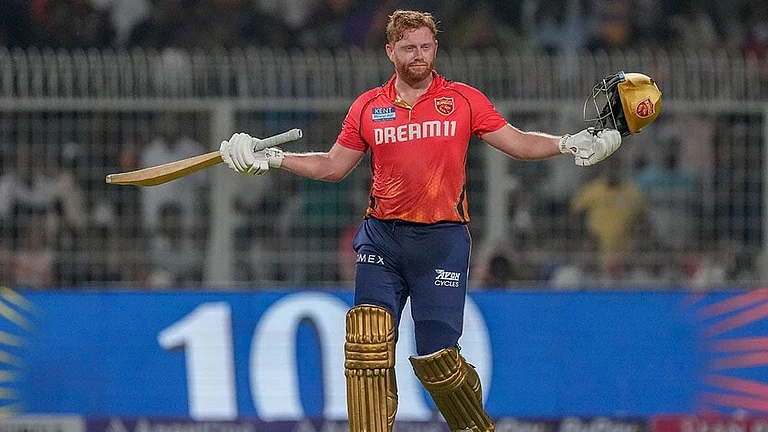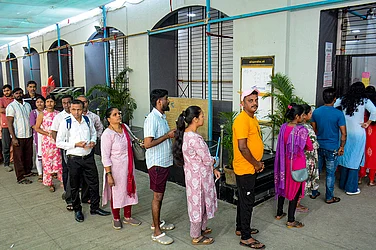When Ghulam Nabi Azad quit the Congress on August 26, Assam Chief Minister Himanta Biswa Sarma claimed that Azad’s resignation letter was similar to the one he had written seven years earlier.
Azad was a senior member of the Congress and served as the Leader of the Opposition in the Rajya Sabha till February 15, 2021. He had also been the minister of health and family welfare in former prime minister Manmohan Singh’s government from 2009 to 2014. His resignation letter castigated the top leadership of the party, especially former president Rahul Gandhi, for lack of vision.
“Unfortunately, after the entry of Shri Rahul Gandhi into politics and particularly after January 2013, when he was appointed as Vice President by you, the entire Consultative mechanism which existed earlier was demolished by him,” wrote Azad in his resignation letter.
Sarma, who was sworn in as the 15th chief minister of Assam on May 10, 2021, was a Congress member for over 20 years before quitting the party in 2015.
He had also blamed Rahul Gandhi for mismanagement of the party in his resignation letter: “There is great dearth of inner party democracy in Congress today. When I had humbly told Sri Rahul Gandhi that in front of central observers 52 MLAs out of 79 had categorically and emphatically sought the ouster of Sri Tarun Gogoi, he answered me so arrogantly that it was his prerogative to change Chief Minister. Isn’t it a fact that our Constitution has given power to the MLAs to select a leader of their choice? If that is the constitutional provision, where from does Sri Rahul Gandhi get the prerogative to choose who will rule the people of Assam?”
Sarma had served as minister of health and family welfare in three consecutive governments of former CM Tarun Gogoi from 2001. Some people called him “Tarun Gogoi’s blue-eyed boy”.

But soon after Gogoi inducted his son, Gaurav, into the Congress in 2014, differences cropped up between him and Sarma, say sources. Gogoi started projecting his son as his political heir and future leader of Assam Congress. Sarma, an ambitious politician, left the party to join the BJP in 2015. Ten other Congress members of the Assam Legislative Assembly also went with Sarma.
“Good riddance,” Tarun Gogoi had said.
Political observers claim Sarma’s desertion of the Congress is symptomatic of the leadership crisis in the Northeast. It affects both national and regional parties, most of which are either run by a single leader, or are reeling from workers jumping ship.
“When we were young, we heard names of political leaders such as P.A. Sangma, former CM of Meghalaya, and Dorjee Khandu, former CM of Arunachal Pradesh,” says Ajit Kumar Bhuyan, a journalist and member of the Rajya Sabha. “Now, their sons have become chief ministers.” Sangma’s son Conrad is the current CM of Meghalaya, while Khandu’s son Pema is the CM of Arunachal Pradesh.
“In Assam, the BJP also does not have a second-rung of leaders after Sarma,” added Bhuyan. “Now, leaders like him run one-man shows in their parties.”

The Congress ruled Assam for 15 straight years from 2001 to 2016. Since then, however, it has lost two consecutive Assembly elections in the state—in 2016 and 2021. Its performance in the Lok Sabha elections, in 2014 and 2019, was lacklustre. The Congress has also lost several by-elections and panchayat polls in the state. In-fighting among party workers, a leadership crisis, and the inability of the party to nurture a younger generation of leaders are affecting its performance at the polls, claim sources.
“The Congress has no dearth of second- or third-generation leaders in Assam,” says Subhramitra Gogoi, a young leader of Congress’s Assam unit. “Former MLA Roselina Tirkey, Assam Youth Congress President Angkita Dutta, Sarifa Rahman and Pranjal Ghatowar have been very active at the grassroots level.”
But young leaders also have a tendency to jump ship if they are not allowed to contest polls, says Subhramitra, once a close aide of Sarma.
“The party needs to take precautionary measures to ensure that young people do not leave it,” he added. But it is not only younger leaders and workers who have left the Congress for better opportunities.
In April this year, Ripun Bora, former president of the state unit of the Congress, quit the party and joined West Bengal Chief Minister Mamata Banerjee’s Trinamool Congress (TMC), a new entrant in the state’s political landscape. Bora had unsuccessfully contested the Rajya Sabha polls in March. Sources said his own party members and legislators from their ally, the All India United Democratic Front, voted against him.
Other leaders who have also left the party since 2016 include Sushmita Dev, daughter of former Union minister Santosh Mohan Dev. Sushmita, who was earlier a Lok Sabha member and is currently a Rajya Sabha member, also joined the TMC in 2021.
Ajanta Neogi, the current minister of finance and social welfare in Sarma’s government, joined the BJP in 2020. Before that, she had served in Tarun Gogoi’s ministry for several years. Her mother, Rebati Das, was also an MLA. Pijush Hazarika and Jayanta Mallabaruah—both current MLAs from the BJP—also left the Congress with Sarma in 2015, despite their family’s long association with the party.
A member of the Congress, who did not want to be named, told Outlook that many second-generation leaders were too distant from the people in the state. “Tarun Gogoi was a leader of the masses,” he says. “Even though he was CM for three terms, he always remained accessible to the people and the party workers.”
“But the leaders from the new generation are not connected to the masses at all. Forget the people, they are not accessible even to party workers.”

Congress leaders, however, do not agree with this assessment. Apurba Kumar Bhattacharjee, general secretary of Congress’s Assam unit, says: “Many young leaders are being given responsibilities in the Congress. We are taking various initiatives like Udaipur Chintan Shivir in May this year, to stir younger workers. They will be given opportunities to prove their leadership in the coming polls.”
It is not only the Congress—other parties, too, are dealing with leaders leaving them. Sarbananda Sonowal, the former chief minister of Assam, was earlier a member of the Asom Gana Parishad (AGP), before joining the BJP. Sonowal was elected to the Assembly as an AGP candidate in 2001. However, he left the AGP in 2011 to join the BJP. Since then, he has been elected to the state legislature and the Lok Sabha as a BJP member.
The AGP is an ally of the BJP in the state, even though its regionalist politics seem to be at odds with the latter’s nationalistic politics. Atul Bora, current AGP president, is a member of CM Sarma’s Cabinet.
The party is keen to attract younger people to its ranks. “A political party is a social organisation first,” says AGP spokesperson Manoj Saikia. “Over the past three years, various wings of the party, such as Asom Chhatra Parishad, the student’s wing, or the Yuva Parishad, the youth wing, have been activated at the grassroots.
In Meghalaya, the last Assembly polls in 2018 seemed to be a contest between two families—of CM Conrad Sangma and his predecessor Mukul Sangma. Conrad became the CM by leading the National People’s Party (NPP) and its allies to victory in the state Assembly elections in 2018. The NPP secured 20 seats out of 60 in the Assembly, but formed the government with support from the BJP and other parties.
The NPP was established by Conrad’s father P.A. Sangma, a former Lok Sabha Speaker and CM of Meghalaya, in 2012. Conrad has been accused of dynastic politics by his opponents. His brother James is a minister in his Cabinet, and his sister Agatha became the youngest person to be appointed a minister in the Union government in 2009, at the age of 29. She is also the vice president of the NPP.
“Ideologically, we feel that youngsters bring a new dimension of thinking to the field of politics and governance,” Conrad tells Outlook. “People joining our party feel that they have access to the top leadership of a national party without having to go to Delhi.”
The NPP became the first party from the Northeast to be recognised as a national party in 2019. “Youth see the NPP as an ideal political platform rooted in their identity and culture,” he added.
Two young leaders who have joined the party recently are Alvin Sawkmie and Bajop Pyngrope, a former member of the Congress.
Mukul Sangma, who served as CM in the state for eight years, also has several family members in the state assembly—his brother, Zenith, and wife, Dikanchi D. Shira.
In Arunachal Pradesh, too, the political landscape is dominated by second-generation leaders of powerful families. The current CM, Pema Khandu, is the son of former CM Dorjee. While Pema is now a BJP leader, his father was in the Congress.
Similarly, Kiren Rijiju, the law minister in Prime Minister Narendra Modi’s Cabinet, is the son of Rinchin Kharu, the first pro-tem speaker of Arunachal Pradesh.
Another family that influences the politics in the state is the Gamlins. Jarbom Gamlin was briefly the CM of the state in 2011. His siblings, Jarkar, Jarpum and Jarjum Ete, continue to be active in politics.
Jarkar was a cabinet minister in Pema Khandu’s government, before switching allegiance to the NPP. Jarpum has been the general secretary of the BJP’s state unit, while Jarjum Ete was the general secretary of the All India Mahila Congress. When both of them were denied a ticket in the 2019 elections, Jarpum joined the NPP, while Jarjum Ete went to JD-U.
(This appeared in the print edition as "Two Families Each for the Seven Sisters")


























